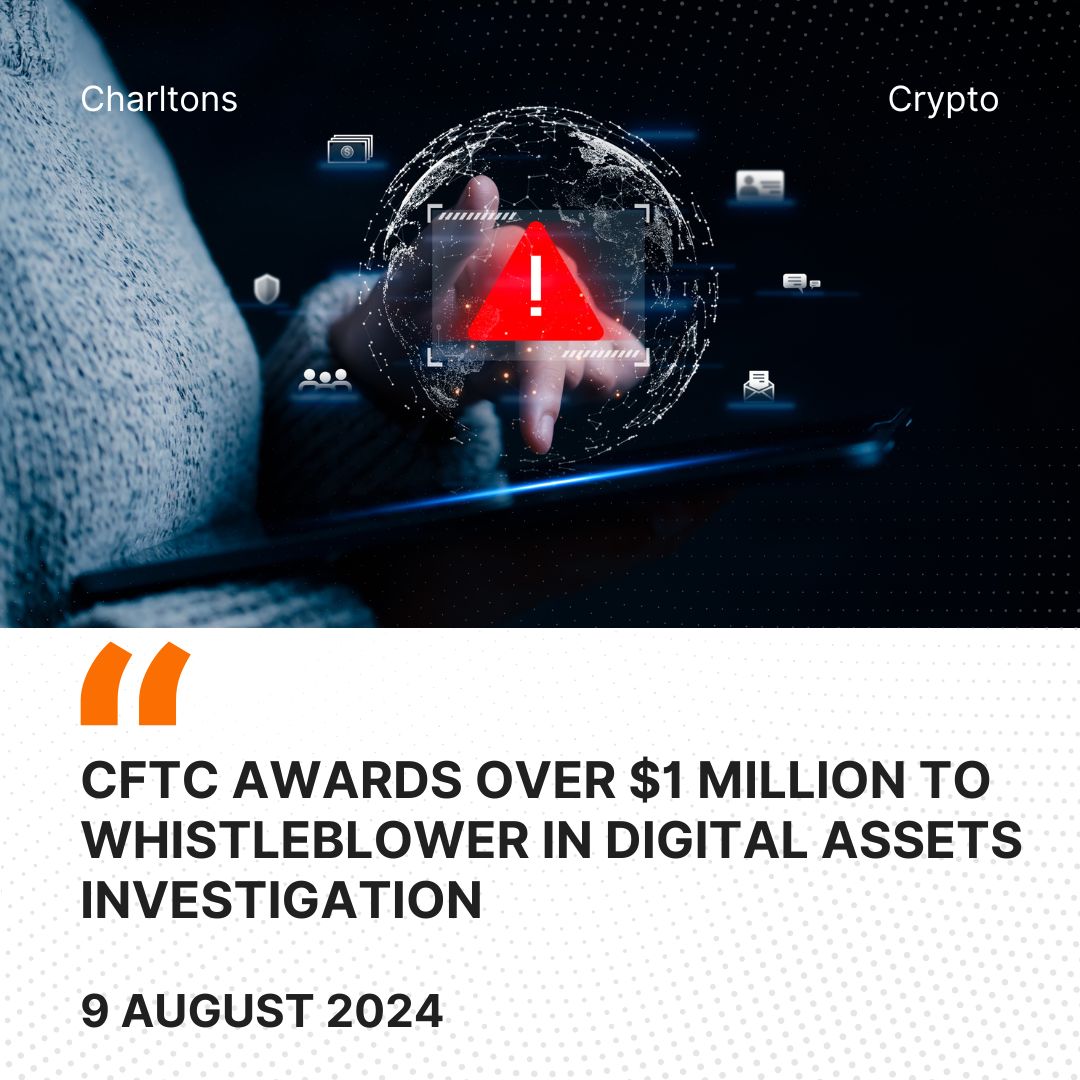
On August 08, 2024, the Commodity Futures Trading Commission (CFTC) announced a whistleblower award exceeding $1 million to an individual who provided crucial information and assistance that significantly contributed to a successful enforcement action in the digital asset markets.
Director of Enforcement Ian McGinley highlighted the significance of the CFTC’s focus on digital asset-related misconduct, stating, “Identifying unlawful conduct in the digital asset marketplace is a major priority for the CFTC, especially as everyday Americans are increasingly victimized by digital asset scams.” McGinley also noted that digital asset cases made up nearly half of the CFTC’s enforcement docket in the last fiscal year, emphasizing the critical role that whistleblowers play in uncovering violations within this rapidly evolving sector.
The whistleblower in this case provided specific and credible information that the CFTC had not previously known, directly leading to the agency’s enforcement action. Brian Young, Director of the CFTC’s Whistleblower Office, acknowledged the growing importance of whistleblowers in the agency’s efforts, particularly in the digital assets space. “Whistleblowers have increasingly played a significant role in the CFTC’s enforcement actions in the digital assets space,” Young remarked, commending the whistleblower for their valuable contribution to the case.
The CFTC’s Whistleblower Program, established under the Dodd-Frank Wall Street Reform and Consumer Protection Act of 2010, has become an essential tool in the Commission’s enforcement efforts. Since issuing its first award in 2014, the program has granted approximately $380 million in awards, connected to enforcement actions that resulted in nearly $3.2 billion in monetary sanctions. The program’s success underscores the importance of community involvement in the fight against financial fraud.
The program incentivizes the general public to come forward with information by offering monetary rewards ranging from 10 to 30 percent of the monetary sanctions collected in enforcement actions. These awards are funded by the CFTC’s Customer Protection Fund, which is exclusively financed through monetary sanctions paid by violators of the Commodity Exchange Act (CEA). Importantly, no funds are taken from injured customers to support the program, ensuring that the focus remains on compensating those who help bring wrongdoers to justice.
The involvement of the general public through the Whistleblower Program has proven to be a powerful means of enhancing regulatory oversight. By offering financial incentives, the CFTC encourages individuals to report potential violations, playing a critical role in maintaining the integrity of the financial markets. This collaborative approach not only aids in identifying and prosecuting fraudulent activities but also fosters a culture of transparency and accountability within the industry.
Community involvement in regulatory enforcement is vital, as it empowers individuals to take an active role in protecting the market from fraud. The CFTC’s commitment to maintaining confidentiality for whistleblowers further ensures that those who come forward can do so without fear of retaliation, thereby strengthening the overall effectiveness of the program. As the digital asset market continues to grow, the participation of vigilant individuals within the community remains a cornerstone of the CFTC’s strategy to uphold the law and protect investors. The CFTC’s Whistleblower Program is a clear example of how regulatory bodies can engage with the public to combat financial fraud and ensure a fair and transparent marketplace.
The CFTC’s Whistleblower Program, created under the Dodd-Frank Wall Street Reform and Consumer Protection Act of 2010, has granted whistleblower awards amounting to approximately $380 million to date, associated with enforcement actions resulting in monetary sanctions totaling nearly $3.2 billion. These awards are paid from the CFTC’s Customer Protection Fund, financed entirely through monetary sanctions paid by violators of the CEA, ensuring that no money is withheld from injured customers to fund the program.
Section 23 of the Commodity Exchange Act (CEA), along with the corresponding Whistleblower Rules outlined in 17 C.F.R. pt. 165, establishes the legal framework governing the CFTC’s Whistleblower Program. These provisions detail the procedures and requirements necessary for individuals to participate in the program and potentially obtain a whistleblower award.
To become eligible for a whistleblower award, individuals must submit a tip, complaint, or referral using Form TCR that details potential violations of the CEA. Whistleblowers can be anyone—corporate insiders, market observers, investors, customers, or even fraud victims. The information provided must be voluntarily submitted before the CFTC contacts the individual or initiates any inquiries related to the information. This proactive submission can lead to the opening of new investigations, re-opening of closed cases, or significantly contribute to ongoing enforcement actions, potentially resulting in a whistleblower award.
The CFTC also allows whistleblowers to submit tips anonymously, although providing contact information is encouraged to facilitate communication. The Commission is dedicated to protecting the confidentiality of whistleblowers, treating all information as non-public during investigations. However, in certain legal proceedings, the CFTC may be required to disclose documents that could reveal a whistleblower’s identity. Additionally, information may be shared with other government or regulatory entities under strict confidentiality agreements. Despite these exceptions, the CFTC’s confidentiality policies are designed to safeguard whistleblowers and encourage the reporting of violations that uphold the integrity of the financial markets.
(Source: https://www.cftc.gov/PressRoom/PressReleases/8939-24, https://www.whistleblower.gov/)





